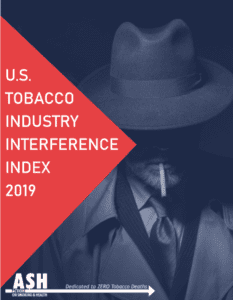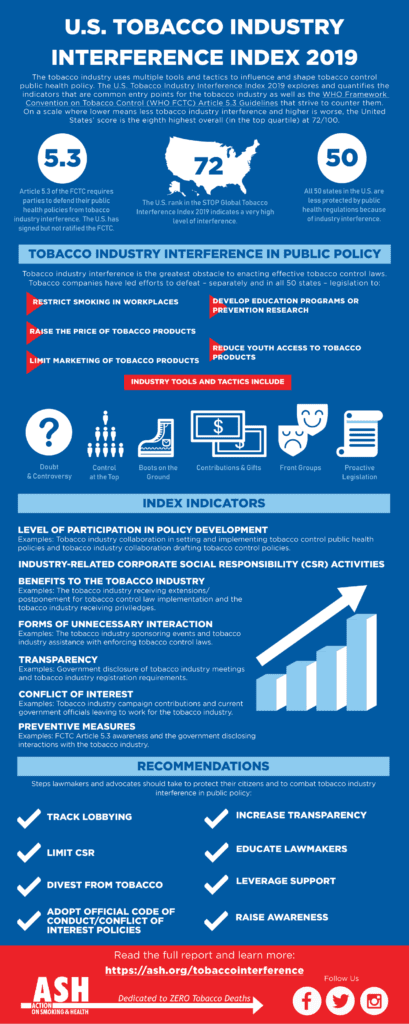
Media Contact:
Megan Arendt
arendtm@ash.org
(202) 390 – 9513
New Report Highlights Tobacco Industry Meddling to Weaken Public Health Policy
The Tobacco (Including Vaping) Industry Cannot be a Stakeholder in Regulating its Products
WASHINGTON, D.C. – OCTOBER 9, 2019 – U.S. Tobacco Industry Interference Index 2019, a report published by Action on Smoking and Health (ASH) and the Oklahoma Tobacco Research Center, shines a spotlight on the vast, organized efforts of the tobacco industry to thwart meaningful public health regulations in America.
-
Read the U.S. Tobacco Industry Interference Index 2019
-
View the infographic
-
Watch videos from experts discussing tobacco industry intererence
Tobacco (which includes vaping) industry lobbyists and front groups operate at every level of government, from Capitol Hill to city hall. In many cases, laws intended to decrease the death and disease from tobacco products have been adopted – and are still in force – despite the fact that they were drafted by the tobacco industry itself. While blame for the nearly half a million American deaths each year from tobacco can be laid squarely on the tobacco industry, their political interference compounds the tragedy by blunting society’s efforts to lessen the toll.

“The tobacco industry has been lurking in the shadows of U.S. public health policy for decades. They not only sell deadly products, they fight lawmakers’ efforts to save lives. This first U.S. Interference Index shines a light on their meddling behind closed doors and gives states and localities new tools needed to protect their citizens from the predatory tobacco industry,” said Doug Matheny, Programs Manager for State and Local Policy at the Oklahoma Tobacco Research Center at Stephenson Cancer Center.
The U.S. Interference Index is part of a global campaign to call attention to tobacco industry efforts, ensuring the industry’s ability to addict new generations remains unabated.
The first-ever Global Tobacco Industry Interference Index 2019, released concurrently by STOP (Stopping Tobacco Organizations and Products), a global tobacco industry watchdog, tracks governments’ implementation of the World Health Organization Framework Convention on Tobacco Control (FCTC), the first global public health treaty. FCTC Article 5.3 declares that the tobacco industry is not a legitimate stakeholder in public policy discussions and obligates governments to keep the tobacco industry at arm’s length. The U.S. has signed but not ratified the FCTC. Regardless, cities and states can hold themselves to the global best practices delineated in the FCTC.
-
Read the Global Tobacco Industry Interference Index 2019
-
Read the Global Tobacco Industry Interference Executive Summary and Recommendations
-
Read the USA Country Summary from the Global Tobacco Industry Interference Index 2019
The U.S. scored among the worst of all countries (72/100 where higher is worse) covered by the Global Interference Index – only seven countries reported greater tobacco industry interference in policymaking. Countries are ranked on overall interference and on specific metrics such as interference in policy development. The United Kingdom, Uganda and Iran emerged as leaders in protecting health policy from industry meddling. Examples of tobacco industry interference include direct lobbying, political contributions, creation and/or funding of front groups to advocate on their behalf, frivolous lawsuits intended to impose legal costs, misleading mass media campaigns, and ensuring seats at the table of government advisory bodies, including with the Food and Drug Administration.
Key findings of the Global Interference Index include:
- Transparency Matters. Countries fared better when they were more open about their dealings with the industry, including recorded interactions and political donations. Political contributions and gifts from the tobacco industry are banned in Brazil, Canada, France, Iran, Myanmar, Turkey, K., Uganda and Uruguay. Among the countries surveyed, transparency on political contributions is required only in Kenya and the U.S.
- Wooing of Senior Officials was rampant across regions. Tobacco companies aggressively targeted departments of Finance, Commerce and Trade to achieve policy influence. They used donations and awards to obtain endorsement from senior officials.
- E-cigarettes pose a new threat. There is growing evidence of the industry using harm reduction claims about e-cigarettes to justify interactions with government officials and open the door to new products. In 2018, tobacco companies lobbied to make it easier for them to sell or promote e-cigarettes in the United States, Philippines, Mexico, Lebanon and Turkey.
- Tax breaks benefitted industry in many countries. Incentives, exemptions and duty-free tobacco boost production and sales in markets that may have other regulations in place. Only Sri Lanka bans duty-free sales of cigarettes.
- Any country can succeed. The UK, Uganda, and Iran are economically, politically and culturally diverse countries and the most successful in resisting industry influence. They prove that any country can have good measures to prevent tobacco companies from having undue influence on health.
The indices are not meant as an exhaustive list, simply because it is nearly impossible to track thousands of incidents at the city, county, state and federal levels, especially given that the tobacco industry will conduct as much interference as they can outside of the public view.
“Unlike other health threats, the tobacco epidemic is caused entirely by a human vector, the tobacco industry,” said Laurent Huber, Executive Director of Action on Smoking and Health (ASH). “We don’t have to worry about pro-Ebola advocates blocking efforts to protect Americans from a deadly virus. With tobacco, it’s a constant struggle against a multi-billion-dollar industry interested only in maintaining as much nicotine addiction as possible.”
The tobacco epidemic kills 12 people a minute which translates into 18,720 people a day worldwide, according to the World Health Organization. At the same time, the tobacco industry market was worth US$ 888 Billion in 2018 and is projected to reach US$ 1,124 Billion by 2024, according to Research and Markets.
The tobacco industry is motivated by profits alone and not good will, they cannot be trusted to self-regulate in any way.
“Currently in the U.S., we’re facing a rapidly evolving vaping crisis because we allowed vaping companies to become a part of the conversation about public health policy. It’s the same mistake we made with cigarettes. As a result, the commercial nicotine delivery industry is flooding the market with both, cigarettes that lead to the death of half a million Americans every year and new products that are addicting American youth. It’s time to put an end to tobacco industry interference,” said Laurent Huber.
“Seven national governments completely exclude the tobacco industry in establishing and implementing tobacco control policy,” said Sandra Mullin, Senior Vice President at Vital Strategies and Board Chair of STOP. “This is why those countries have some of the lowest levels of interference recorded. Our report suggests that even these countries need to be vigilant against new industry tactics. You simply cannot create healthier, smoke-free environments with tobacco companies involved in the policy process.”
ACTION ON SMOKING AND HEALTH
Founded in 1967, Action on Smoking and Health (ASH) is America’s oldest anti-tobacco organization, dedicated to a world with ZERO tobacco deaths. Because tobacco is the leading cause of preventable death worldwide, ASH supports bold solutions proportionate to the magnitude of the problem. https://ash.org








